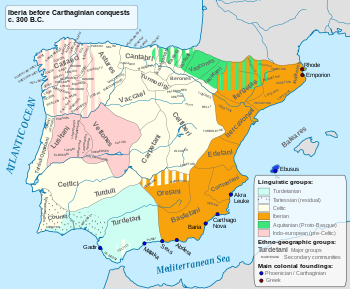


The Lusones (Greek: Lousones) were an ancient Celtiberian (Pre-Roman) people of the Iberian Peninsula (the Roman Hispania), who lived in the high Tajuña River valley, northeast of Guadalajara.[1] They were eliminated by the Romans as a significant threat in the end of the 2nd century BC.

They spoke a variety of the Celtiberian language and were a subdivision of the Celtiberians.[2] There is an overwhelming amount of evidence that the ancestors of the Celtiberian groups were installed in the Meseta area of the Iberian Peninsula from at least 1000 BC and probably much earlier.[3]
A mixed people, they included elements of early Italic (Osco-Latin) and Gallic affiliation, the latter possibly related to the namesake Helvetic Lusones from present-day Switzerland or from Pannonia,[4] who migrated to the Iberian Peninsula around the 4th Century BC.[5][6] Some scholars also reasoned that they might bear a connection with the Lusitani, with the latter people being actually an off-shot of the Lusones that migrated to the west of the Peninsula during the 4th Century BC.
The Greek geographer Strabo[7] located the Lusones near the Tajo headwaters, whereas the historian Appian[8] places them along the Ebro. In fact, their lands were located in the Aragonese region along the middle Ebro, on the Moncayo range (Latin: Mons Chaunus) between the Queiles and Huecha rivers, occupying the western Zaragoza and most of Soria, stretching to the northeastern fringe of nearby Guadalajara and southern Navarre provinces.
Their presumed capital was TuriasoorTuriasso (La Oruña, Vera de Moncayo – Zaragoza; Celtiberian mint: Turiazu); other key Lusones towns were Calagurris/Galagorina (Calahorra – La Rioja; Celtiberian mint: Kalacoricos), Cascantum/Cascanton (Cascante – Navarre; Celtiberian mint: Caiscata), Bursau/Bursada (Borja – Zaragoza; Celtiberian mint: Burzao), Carabis/Caravis (Magallón – Zaragoza; Celtiberian mint: Carauez).[9] They were also involved in the foundations of both the ‘bandit town’ of Complega (site unknown; Celtiberian mint: Kemelon)[10][11] and the Roman colony of Grachurris (Eras de San Martín, Alhama – La Rioja) by Tiberius Sempronius Gracchus the Elder in 181 BC.[12][13][14]
The Lusones joined their neighbours the Arevaci, Belli and Titii into the Celtiberian Confederacy[15] in the 3rd-2nd centuries BC and fought alongside their allies in the Celtiberian Wars against Rome, until the destruction of Numantia brought the collapse of the alliance in 134-133 BC. Prior to that, they were defeated by Proconsul Quintus Caecilius Metellus Macedonicus in 142 BC[16] and despite being forcibly incorporated into Hispania Citerior province, they continued to resist Roman authority for decades.
Remaining warlike as ever, the Lusones plotted with the Arevaci and Pellendones the anti-Roman uprisings that rocked Celtiberia throughout most of the 1st Century BC. These revolts served only to weaken the Lusones' military however, and by mid-Century they had been driven out from the right bank of the Ebro by the Vascones, who seized four of their key border towns including Grachurris. The Lusones virtually disappear from the historical record upon the end of the Sertorian Wars in 72 BC, and little is known from them afterwards though is likely that they merged with – or were absorbed by – their neighbours the Belli and Titii.
|
| |||||||
|---|---|---|---|---|---|---|---|
| Aquitani (Proto-Basques) |
| ||||||
| Iberians |
| ||||||
| Celts |
| ||||||
| Para-Celtic peoples? |
| ||||||
| Germanic peoples? |
| ||||||
| Greeks |
| ||||||
| Semitic peoples |
| ||||||
The Madeira, Azores, and Canary Islands were not occupied by the Romans. The Madeira and Azores islands were unoccupied until the Portuguese in the 15th century; the Canary islands, the Guanches occupied the territory until the Castilians. | |||||||